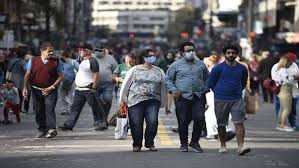This week, Latin America outstripped both the United States and Europe to officially register more daily new cases of coronavirus, earning the Americas the dubious distinction of becoming the world’s newest epicenter of the global pandemic crisis, according to the World Health Organization. The pandemic is shifting from the developed world and into the developing world—that should worry a whole lot more people than it currently does.
Why It Matters:
Latin America benefitted by being a few months behind the initial outbreak, giving it some time to register the scale of the challenge to come and prepare accordingly. Of course, different countries still took the threat more seriously than others, which can be partially seen in the case and fatality rates to date… but that isn’t the whole story. While virtually every country in the region has instituted social distancing measures to combat the health crisis and some degree of government stimulus to combat the accompanying economic crisis, the effectiveness of both ultimately depends not just on the size and quality of these emergency measures taken, but each country’s contexts (political, healthcare, social, and economic) going into this crisis. No one should be surprised that Argentina is struggling with the economics given its precarious financial position even before the pandemic, or that Peru is struggling with healthcare following decades of underinvestment in health infrastructure (despite one of the region’s most proactive responses to coronavirus).
Each of these countries has a unique story to tell. But this pandemic expose and speeds up many of the problematic existing political trends in the region. Latin America’s new middle class, largely created by the last two decades of globalization-fueled growth and some conveniently-timed commodity super cycles, was already fed up with endemic inequality and corruption, and for years of being promised good public services that never materialized. That was a massive problem before the global economy started slowing down, and it didn’t disappear when the global economy cratered. And if you think that an unprecedented economic squeeze was what these countries needed to undertake serious reform, then you haven’t been paying attention to Latin America these last few decades.
In the early phase of this crisis, the priority has been given to the health considerations; but as the economic hits mount (and lockdowns become harder to both maintain and reinstitute, a problem not just for Latin America but many developing countries where social distancing simply can’t be enacted given population densities and living conditions in poorer areas), economic considerations will start winning out. This guarantees the region a prolonged bout with coronavirus, which will take a serious toll on both countries’ health care capacity and their economies. The same arguments currently being had over reopening and lives vs. livelihoods as in the U.S. will dominate Latin American politics for weeks and months to come.
What Happens Next:
Let’s start with the easy part—Latin American government finances are about to take a hit, both from the decline in tax revenue associated with lockdowns and the resources drawn for much-needed economic stimulus to keep economies afloat. Central banks and treasuries in Latin American countries simply can’t sustain the type of government stimulus that their European and North American counterparts can. That means more corporate and income taxes down the line, but that might not be enough to stave off defaults and sovereign credit rating downgrades—we’ve begun to see this in Argentina; Ecuador, Brazil and Mexico are also countries to watch.
A wave of defaults across developing markets will have a real impact on the state of the global economy, a greater concern when that global economy is itself under duress. It will also make it a more challenging economic environment for governments to address the legitimate criticisms of corruption, inequality, and anemic economic growth that have been driving the region’s politics for the last few years.
And this is an immediate political crisis for the region, as the continent has plenty of elections coming up over the next couple of years; if frustrations continue to run high, we may be looking at another anti-establishment wave. The flip side is that with so many elections on the horizon, very few governments will want to undertake painful economic reforms to balance budgets; it’s easier just to give into demands to spend more and figure it out later.
That’s painting in broad brush strokes; it’s also worth watching how specific countries are faring.
In Argentina (roughly 15,000 cases and 500 deaths), the country has already begun making its way through its ninth sovereign credit default. The economics are going to get worse, and being on the financial brink has real inflation threat. President Alberto Fernandez is up in polls for now in response to a strong initial health response, but that popularity will take a hit along with its economy. Just as concerning is the returning influence of vice president (and former president) Cristina Kirchner on economic talks.
When it comes to Brazil (roughly 440,000 cases and 26,750 deaths), no democratically elected world leader has been more destructive to their country’s coronavirus response than Jair Bolsonaro, which is saying something. The country has seen two capable health ministers go in less than a month, and the political crisis is further fueled by the possibility of impeachment charges against Bolsonaro for non-Covid-19 related matters. A decentralized governing system and assertive governors taking necessary measures has mitigated matters somewhat, but Brazil has some real healthcare struggles ahead, especially as testing remains relatively low and complicates reopening efforts.
In Chile (roughly 87,000 cases and 890 deaths), social unrest before coronavirus forced the government to offer rewriting the constitution in a bid to appease protestors. The strong crisis response by the government has given them a temporary boost in the polls, but the underlying issues—like widespread inequality—continue to run deep, and will reemerge as long as the economic struggle drags on. And Chileans will have plenty of chance to voice their concerns with local and national election (and that constitutional referendum) all scheduled over the next year and a half.
For Colombia (roughly 25,500 cases and 850 deaths), President Ivan Duque is up in the polls, but that boost is probably short-lived as the economy begins to tumble (exacerbated by that ill-timed oil price war). Colombia’s fiscal realities also seriously limits the amount of government stimulus that can be injected into the economy. In this type of environment, it will be hard to pass needed fiscal reforms, and could lead to an anti-establishment choice in 2022 presidential elections.
Ecuador (roughly 38,500 cases and 3,300 deaths) looks to be getting a new IMF program, but when you’re applying for IMF programs, you’re already in trouble. Ecuador will remain in a precarious economic and social condition as evinced by recent protests. The good news is that they have elections in Feb 2021… which is also the bad news depending on your political orientation.
Mexico’s (roughly 81,400 cases and 9,000 deaths) Andres Manuel Lopez Obrador started with high popularity, and his lackluster response to the coronavirus (there still remain legitimate questions of the veracity of official government tallies, and testing isn’t where it needs to be for reopening safely) will surely cost him some of that, but overall he remains broadly popular given his anti-corruption fixation and the fresh memory of his predecessors. But the Mexican economy will take a hit these next few weeks and months, which will make him feel the pressure and try to centralize more power to push through his decidedly not-market-friendly policies.
Peru’s (roughly 142,000 cases and 4,100 deaths) President Martin Vizcarra’s response to coronavirus has been admirable on the health side, but there’s only so much you can do following decades of healthcare mismanagement. And while Vizcarra isn’t responsible directly for the limited health capacity, it’s now his problem, alongside the economic crisis that typically accompanies coronavirus. All of which boost anti-establishment politicians heading into April 2021 elections.
As for Venezuela (roughly 1,300 cases and 11 deaths), it has so far had a limited coronavirus impact… which is pretty much the only thing the country has going for it at the moment (that sudden oil price war didn’t do it any favors, either). Nicolas Maduro is still likely to remain in power, but times of uncertainty make leaders grip the reins more tightly.
The One Major Misconception About It:
That Latin America is a uniformly bad story when it comes to coronavirus. Uruguay (roughly 800 cases and 22 deaths) and Cuba (roughly 2,000 cases and 82 deaths) have some of the best results when it comes to containing coronavirus, not only compared to Latin America but the rest of the world. Got to give credit where credit is due.
The One Thing to Say About It on a Zoom call:
The lives vs livelihoods debate is a real one… but for the developing world, that same debate can also be recast as having to choose between a short-term vs. a long-term crisis. As coronavirus continues to spread across developing and emerging government, more governments will be faced with no-win situations like these. (Time Magazine)






































